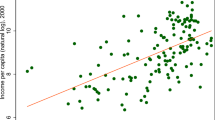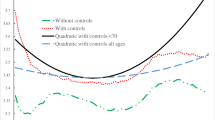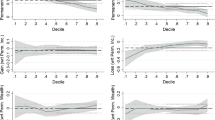Abstract
Recent public opinion polls report that a majority of Americans consider the nation’s population growth rate to be a “serious” problem. Little systematic evidence exists on whether they view the problem as a factor that the individual married couple should consider in deciding on family size. A survey of 134 adult women living in a limited-income family housing project in a relatively small and isolated American community suggests: the view that continued population growth is a problem in the United States is endorsed more strongly than the view that the couple has a responsibility to limit its fertility because of overpopulation; and concern with population growth is only loosely associated with acceptance of the individual responsibility attitude. Among subgroups of respondents, Catholics were more likely to hold a negative attitude toward population growth than to possess the individual responsibility view and they exhibited a correlation between the two attitudes. Protestants were distinguished by no difference in or correlation between the acceptance of the two attitudes. A correlation between the attitudes was especially pronounced among Catholics with high achievement values. It is suggested that measures explicitly intended to control population growth probably cannot be adopted until there is a strong correlation between the two attitudes.
Similar content being viewed by others
References
Barnett, Larry D. 1969. Education and religion as factors influencing attitudes toward population growth in the United States. Unpublished manuscript.
Barnett, Larry D., and Jerry J. Griffith. 1969. Anomie and achievement values and attitudes toward population growth in the United States. Pacific Sociological Review, forthcoming.
Blake, Judith. 1966. The Americanization of Catholic reproductive ideals. Population Studies 20:27–43.
Davis, Kingsley. 1967. Population policy; will current programs succeed? Science 158:730–739.
Kantner, John F. 1968. American attitudes on population policy: recent trends. Studies in Family Planning no. 30:1–7.
Lenski, Gerhard. 1963. The Religious Factor. Garden City; Doubleday.
Riley, Matilda W. 1963. Sociological Research: I. A Case Approach. New York: Harcourt, Brace, and World.
Rosen, Bernard. 1964. Family structure and value transmission. Merrill-Palmer Quarterly 10:59–79.
Srole, Leo. 1956. Social integration and certain corollaries: an exploratory study. American Sociological Review 21:709–716.
Zetterberg, Hans L. 1965. On Theory and Verification in Sociology. Third Edition. Totowa, New Jersey: Bedminister Press.
Author information
Authors and Affiliations
Rights and permissions
About this article
Cite this article
Barnett, L.D. U. S. population growth as an abstractly-perceived problem. Demography 7, 53–60 (1970). https://doi.org/10.2307/2060022
Issue Date:
DOI: https://doi.org/10.2307/2060022




